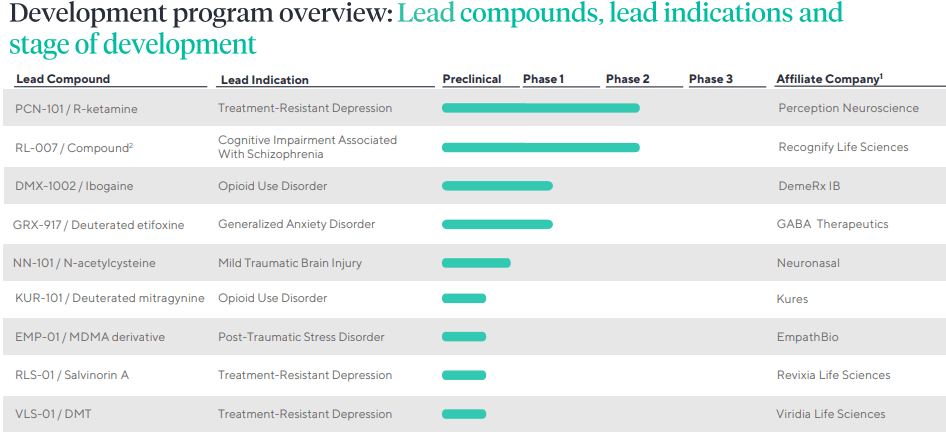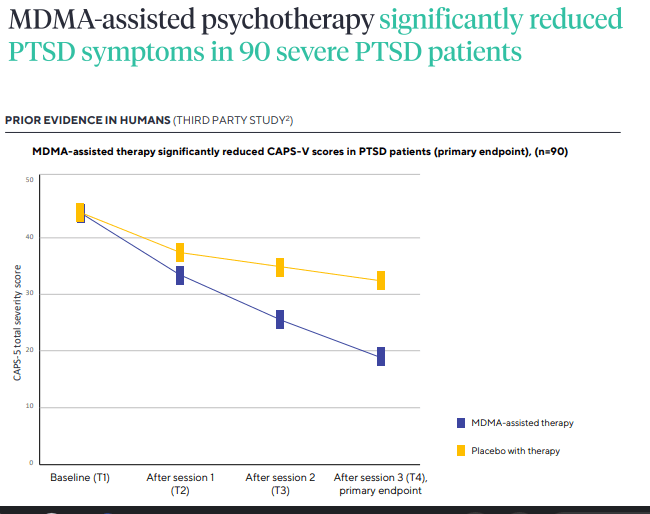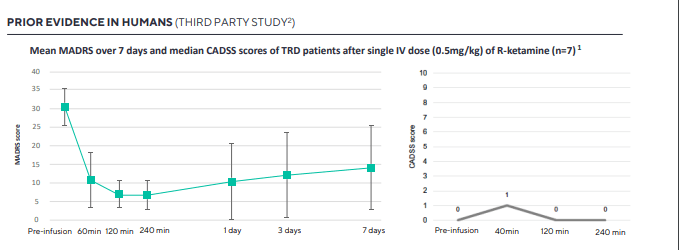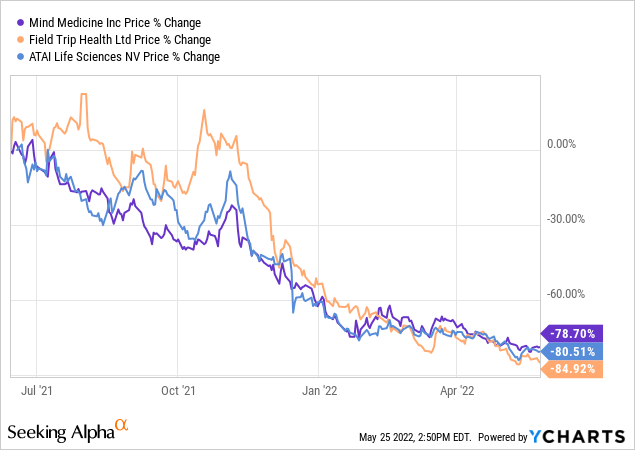Ibrahim Akcengiz/E+ via Getty Images
Atai Life Sciences (NASDAQ:ATAI) is one of several listed companies that is very active in the alternative mental health space. The company has a large portfolio of drugs, mainly psychedelics, that can be used to treat mental health conditions when other options have failed (i.e., treatment resistant depression). Oddly, the concept of using psychedelics for mental health is not even that fringe anymore. Johns Hopkins posted an initial study that showed that psilocybin was effective in treating major depression disorder, with the effects lasting up to one year. Ketamine therapy is also a very popular treatment that is already widely available in the United States for conditions such as PTSD. Most importantly, it is clear to see that traditional treatment options fail many types of patients, and many people also go without treatment for a wide variety of reasons. These factors, coupled with declining R&D for new drugs, have created a space where alternative medications and therapies can gain footing during this decade. Investors will have to be patient with this theme, though, as it may take years for companies to gain traction due to legal issues. Atai Life Sciences is one of the main companies that I am following in this space, which has a strong enough cash balance to push through the end of 2023.
Not Enough Industry Innovation To Address Growing Issues
Mental health Issues are a global burden: The National Alliance on Mental Health estimates that mental health issues cost the United States $300 billion per annum due to productivity losses. Additionally, roughly two thirds of people go without treatment. This can occur either because of lack of access to services, lack of awareness, or because of the negative side effects of the medication. Notably, the number of Americans suffering from anxiety and depression rose by 4x during the end of 2020.
Lack of new drugs approved: Only 17 new neuropsychiatric drugs have been approved since 2015. R&D efficiency has halved 9 years for the past 60 years. The number of new drugs introduced every year has also remained flat most years between the 1950s-2010s. Many large companies still feel that a focus on neuroscience may not be the best use of their resources.
Not Responding Adequately: Around 33% of people diagnosed with depression do not respond adequately to treatment and relapsed. Some people may need to switch to a different medication or take multiple medications. This also does not factor in issues associated with misdiagnosis/delayed diagnosis. Some mental health conditions, such as bipolar disorder for example, can take up to 8 years to diagnose following the initial onset of symptoms. There is plenty of room for alternative types of treatments for most types of mental health conditions.
Undesirable Side Effects: This is one of the main reasons why people are not compliant with taking medication. In some cases, there are virtually no risk-free or completely safe options, which reflect that there is ample room for innovation in this space, as patients may be open to alternatives when other options have failed.
Addiction: Addiction is also much harder to treat. For example, around 75% of patients treated for opioid use disorder end up relapsing. The rate for substance abuse disorders is around 40-60%. A lot of companies in this space also focus on group therapy sessions, on top of medication, to help reduce the risk of relapse.
Company Solution
Atai Life Sciences has a strong pipeline of drugs for the next 18 months, and will pursue aggressive growth. The company had $335 million in cash as of May 2022, which is roughly 50% of its current market cap. This provides the company with enough room to continue through the end of 2023, as it continues to focus on developing its pipeline of treatments. Apart from the mental health space, the company is also examining the anti-inflammatory nature of various psychedelics, to develop new applications in the future.
Overview of Drugs
|
Psilocybin |
Also known as magic mushrooms. Psilocybin can be used for treatment resistant depression. |
|
Arketamine |
One of the enantiomers of ketamine, which is used for sedation/pain/depression. Ketamine as a nasal spray has already been FDA approved. |
|
Ibogaine |
Psychoactive substance found in the Apocynaceae trees. It is used to treat opioid withdrawals. |
|
Deu-Etifoxine |
Was originally developed in the 60s to compete with benzodiazepines, but never made it to the US/EU markets. This drug binds to GABA receptors. |
|
N acetylcysteine |
non-psychedelics used to help treat TBI. |
|
N-dimethyltryptamine |
Psychedelic with rapid onset and short duration (DMT) |
|
MDMA derivative |
Commonly known as Ecstasy |
|
Deu-Mitragynine |
Also known as kratom, which is native to SE Asia. It is used to help with pain or fatigue. |
|
Salvinorin A |
Derived from salvia, which is a member of the mint family. |
Collectively, all of these drugs have the potential to treat a wide variety of mental health issues. The majority of its drugs are either in preclinical or phase 1 of development. While options like ketamine are already approved and available in the United States, other options may face legal barriers and potentially resistance from patients. However, the FDA is recognizing the potential of many of these drugs, and drugs like MDMA could become legal by next year in certain places. Certain states in the United States have also decriminalized magic mushrooms, so these may be used in therapy in the future.

Atai Life Sciences
Certain studies conducted by Atai Life Sciences, as well as studies conducted in previous years by other groups, showed tremendous success in a variety of health issues, including treatment-resistant depression and PTSD to name a few.

Atai Life Sciences
Ketamine therapy is also becoming very popular in the United States, as it can help with issues related to addiction, PTSD, and treatment-resistant depression to name a few. Ketamine therapy includes multiple therapy sessions, in which someone attends group therapy and receives ketamine through an IV. Some companies, such as Mindbloom, even offer online ketamine therapy.

Atai Life Sciences
Digital Initiatives
Covid-19 has changed the landscape of mental health services, given that people had increasingly harder time accessing basic mental health services. As a result, many companies have launched digital initiatives to increase access to care. Atai Life Sciences has launched Introspect, which will help to provide digital therapies, in combination with its drugs, to offer a higher level of service to its customers.
Targeting Strategic Issues
Atai Life Sciences has focused on a handful of mental health issues that do not have adequate treatment available. In other cases, it also develops drugs that focus on a certain subset of symptoms that mainly go unaddressed with current medication options.
|
Issue |
Notes |
|
Depression |
Treatment resistant depression occurs after two failed courses of antidepressants. Around ⅓ of people treated for depression have TRD. ATAI has ketamine, DMT and salvia products for this condition. |
|
Schizophrenia |
ATAI focuses on CIAS. There is currently no treatment for cognitive impairment associated with schizophrenia (80% have these symptoms). |
|
Substance Abuse |
Through DemeRX, Atai Life Sciences targets people suffering from addiction to opioids. |
|
Anxiety |
Offers an alternative to patients who did not respond well to antidepressants and benzodiazepines. |
This space is filled with multiple listed companies that have similar offerings. Two other companies that I follow in this space include Mind Medicine (MNMD) and Field Trip (FTRP). The legal environment that all of these companies have to navigate is very difficult to navigate, and frankly impossible to predict. Initial developments, including the FDA granting psilocybin breakthrough therapy status, coupled with states like Oregon legalizing psilocybin, are encouraging.

Ycharts
Companies in this space have been performing poorly during the past year, after peaking in early 2021. It will be a long road if you are investing in these companies, and I wouldn’t touch any of these stocks unless you strongly believe in this disruption potential, initiate small positions (similar to the size of a call option) and are willing to hold through 2025. The legal progressions that will take place are entirely unpredictable, although initial progress is somewhat encouraging. Atai Life Sciences is also very confusing to analyze because it operates through ownership of many different companies (one for each drug) and it does not focus on one type of psychedelic like other companies. I am starting to wait for a bottom, and will continue to monitor pipeline updates for ATAI every quarter.
Beyond Mental Health
Atai Life Sciences may also be able to break into new areas. The company is currently examining areas such as autism spectrum disorder, ADHD, OCD and binge-eating disorder. There is also room for further growth if psychedelics can be used to help with autoimmune disorders. This is another trend to monitor in the coming years.
